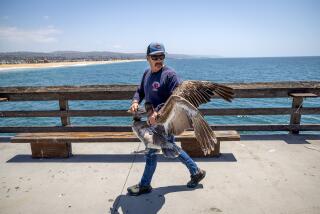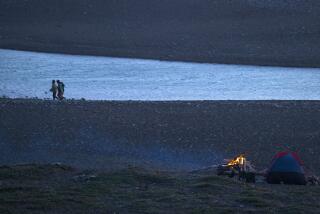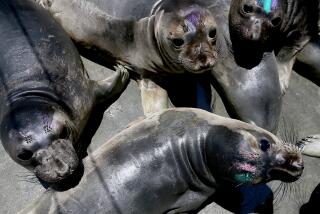In Newport, Fouled Water May Rule Out Feeding Fowl
- Share via
All Mike Berland has to do is raise a slice of bread over his head and pigeons flock by the dozen to his Newport Bay houseboat. A few blocks away, sea gulls feast on leftover French fries at a snack bar. And over by the Rialto Canal, Faythe Parks knows why the ducks swim her way every time she walks along the water.
“In Newport Beach, when birds see people, they think food,” Parks said.
But that’s a problem, say city officials.
Concerned that an unnaturally large bird population is polluting the city’s waterways with fecal waste, the City Council on Monday will consider an ordinance prohibiting people from feeding pigeons, ducks, geese and other wild birds as well as seals and sea lions.
The ban would apply to all public property as well as the waters of Newport Bay and Newport Harbor.
City officials believe that the waste produced by the birds has caused high levels of coliform bacteria to accumulate in the bay, forcing the closure of several small beaches.
Officials have so far been unable to establish a direct scientific link between the fecal matter and high levels of coliform, but they say strong evidence suggests a connection.
Steve Luy of Newport Beach’s Public Works Department stated in a report that levels of coliform decreased significantly at Dana Point Harbor after someone stopped leaving large amounts of bird food along the shore.
He also noted that the bird population rises in areas of Newport Bay where people regularly feed the birds.
The proposed ordinance calls for the posting of signs in problem areas, such as Newport Island, the Rhine Channel, and Lido and Balboa islands. People caught feeding animals would be cited. The amount of the fines have yet to be determined.
Councilwoman Norma Glover said she favors the ordinance and hopes it will help clean up--and open up--polluted portions of the city’s shoreline.
She said the Orange County Health Care Agency has closed at least three of the city’s bayside beaches, one of them along the Rhine Channel. Most of the beaches, she said, are narrow shorelines not heavily used by the public.
While many people enjoy scattering bread crumbs, fish or other foods for birds, Glover said the consequences are simply too harmful to the environment. She said people who swim in the polluted areas may become ill and suffer nausea and dizzy spells.
“People do it with the kindest, gentlest motives, but the end product can be detrimental to water quality,” she said.
Bobby Borrego, the manager of the Stuft Surfer, a snack shop along the shore, isn’t sure if the ordinance will discourage people from feeding birds. But he is certain of one thing: “The birds do poop a lot”.
Sea gulls often shower the restaurant’s outdoor tables with bird droppings, he said, forcing staff to clean the tables regularly.
Berland, who has lived on a houseboat off Lido Island for two years, said boat owners are constantly complaining about having to wipe their boats clean of droppings.
He doubts the ordinance will work, believing that birds will still have plenty of places to get food. “If they were serious about it, they would force restaurants to put screens over their dumpsters,” he said.
More to Read
Sign up for Essential California
The most important California stories and recommendations in your inbox every morning.
You may occasionally receive promotional content from the Los Angeles Times.














